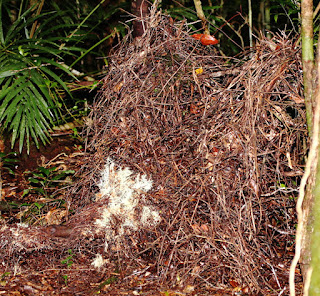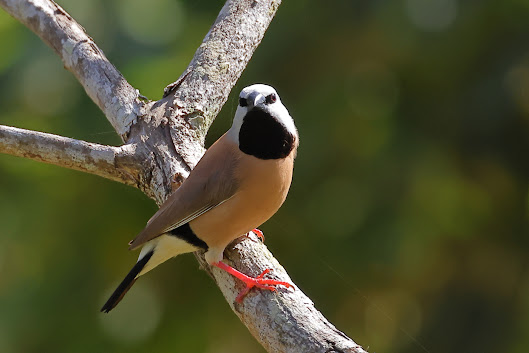Car's life shortened, but mine expanded with memorable minutes watching Mr Gorgeous.
And he even gave out a few of frog-like croaks.
Now I know what to listen for when close to the mighty bower.
Also in same area, and singing mightily above his upsidedown-leaf-strewn bower, Tooth-billed Catbird (Scenopoeetes dentirostris).
Species used to be Bowerbird. Before that, Catbird.
Bowerbird's more apt, but he probably couldn't care less.
Click pix to enlarge











The Golden bird is absolutely beautiful. Another one for my "to see" list!
ReplyDeleteMaybe north for next big trip?
ReplyDeleteA beautiful species and very handy camera work!
ReplyDeleteThe golden bowerbird is such a stunner. And an expert builder, too boot!
ReplyDeleteThere's a tooth-billed bowerbird not 10 metres from me as I type this. He has a display area in the back garden and he's singing his heart out. But do you think I can get pics as good as yours? Not a chance! Excellent work.
Thanks Russell. Put best one up on birding-oz and got some great advice on improving flash use.
ReplyDeleteHi Bronwen: Perhaps you've got a camera-shy lad. I spent lot of time trying to snap Toothy close to rather ill-defined bower under wait-a-while tangle. Couldn't get clear views and he much preferred two or three higher spots, when I was close by.
Hi Tony.
ReplyDeleteStunning bird and great images too.
I could not work out if the Bower is a full structure, or an "arena" as the Satin Bowerbird's Bower is. I know some of the PNG relatives build entire "rooms".
I shall have to do more reading up on that one.
Its not fair the way the Catbird keeps changing its mind on which genus it wants to be in.
Fussy bird?
I suspect damned Taxonomists at work.
Nice post.
Cheers
Denis
Hi Tony
ReplyDeleteMe again.
.
I could not figure out the structure of your Golden BB's Bower.
Just found this:
"The male Golden Bowerbird builds a maypole type of bower of one or two towers of sticks up to 3m tall with a display perch. Skilfully laid sticks connect the towers and decorations are placed on them. These are often white, off-white and pale green orchids, jasmine, other flowers, seedpods and lichens.
.
The sticks become glued together by the action of fungi after some time."
So that helps explain the white mass of fungal mycelium visible in your image.
You probably know that -- but I didn't.
Denis